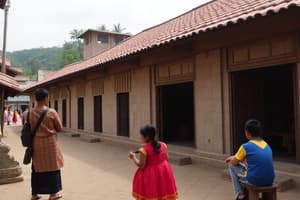Podcast
Questions and Answers
Ano ang pangunahing layunin ng pag-aaral ng Araling Panlipunan?
Ano ang pangunahing layunin ng pag-aaral ng Araling Panlipunan?
Alin sa mga sumusunod ang hindi bahagi ng kontemporaryong isyu sa Araling Panlipunan?
Alin sa mga sumusunod ang hindi bahagi ng kontemporaryong isyu sa Araling Panlipunan?
Bakit mahalaga ang pag-aaral ng iba't ibang sistema ng politika at ekonomiya sa Araling Panlipunan?
Bakit mahalaga ang pag-aaral ng iba't ibang sistema ng politika at ekonomiya sa Araling Panlipunan?
Alin sa mga sumusunod ang naglalaman ng mga isyu na may kinalaman sa globalization?
Alin sa mga sumusunod ang naglalaman ng mga isyu na may kinalaman sa globalization?
Signup and view all the answers
Ano ang isa sa mga benepisyo ng pag-aaral ng Araling Panlipunan tungkol sa pagkakakilanlang pambansa?
Ano ang isa sa mga benepisyo ng pag-aaral ng Araling Panlipunan tungkol sa pagkakakilanlang pambansa?
Signup and view all the answers
Ano ang pangunahing layunin ng Araling Panlipunan?
Ano ang pangunahing layunin ng Araling Panlipunan?
Signup and view all the answers
Aling bahagi ng Araling Panlipunan ang sumasaklaw sa mga pag-unlad mula sa mga pre-kolonyal na lipunan hanggang sa kasalukuyan?
Aling bahagi ng Araling Panlipunan ang sumasaklaw sa mga pag-unlad mula sa mga pre-kolonyal na lipunan hanggang sa kasalukuyan?
Signup and view all the answers
Ano ang isa sa mga pangunahing tanong na sinasaklaw ng Philippine Government and Politics?
Ano ang isa sa mga pangunahing tanong na sinasaklaw ng Philippine Government and Politics?
Signup and view all the answers
Aling bahagi ng Araling Panlipunan ang tumutugon sa mga hamon sa ekonomiya ng Pilipinas?
Aling bahagi ng Araling Panlipunan ang tumutugon sa mga hamon sa ekonomiya ng Pilipinas?
Signup and view all the answers
Aling kakayahan ang hindi nabanggit bilang layunin ng Araling Panlipunan?
Aling kakayahan ang hindi nabanggit bilang layunin ng Araling Panlipunan?
Signup and view all the answers
Alin sa mga sumusunod ang hindi kasama sa mga paraan ng pagtuturo sa Araling Panlipunan?
Alin sa mga sumusunod ang hindi kasama sa mga paraan ng pagtuturo sa Araling Panlipunan?
Signup and view all the answers
Anong sangay ng Araling Panlipunan ang nakatuon sa mga tradisyon at paniniwala ng mga Pilipino?
Anong sangay ng Araling Panlipunan ang nakatuon sa mga tradisyon at paniniwala ng mga Pilipino?
Signup and view all the answers
Alin sa mga sumusunod na sangay ng Araling Panlipunan ang maaaring suriin ang epekto ng natural na yaman sa pamumuhay ng mga tao?
Alin sa mga sumusunod na sangay ng Araling Panlipunan ang maaaring suriin ang epekto ng natural na yaman sa pamumuhay ng mga tao?
Signup and view all the answers
Signup and view all the answers
Study Notes
Introduction to Araling Panlipunan
- Araling Panlipunan is a Filipino social studies subject.
- It covers a broad range of topics, including Philippine history, geography, government, economics, and culture.
- The aim of Araling Panlipunan is to develop critical thinking and civic awareness in students.
- It encourages students to understand national and global issues.
- It explores social, cultural, and political interactions.
Key Components of Araling Panlipunan
- Philippine History: This component traces the development of the Philippine archipelago, from pre-colonial societies to the present. It includes significant events, individuals, and historical trends.
- Philippine Geography: This component explores the physical characteristics of the Philippines, including its landforms, climate, natural resources, and human impact.
- Philippine Government and Politics: This component examines the structure and function of the Philippine government at local, national, and international levels. It also includes the study of political ideologies, social movements, and Philippine foreign policy.
- Philippine Economics: This component focuses on the economic systems, policies, and challenges faced by the Philippines, including its workforce, trade, and industry.
- Philippine Culture: This component surveys the rich traditions, beliefs, values, arts, and social structures of the diverse cultures in the Philippines.
Learning Objectives and Skills
- Develop critical thinking and problem-solving skills for social issues
- Enhance understanding of social, cultural, and political issues affecting the nation
- Analyze different historical perspectives and interpretations
- Evaluate various economic systems and policies
- Improve citizenship and participation in democratic processes
- Foster appreciation of diversity and inclusivity
- Develop research and presentation skills
- Encourage active participation and dialogue on social issues
Curriculum and Assessment of Araling Panlipunan
- Specific content and skills covered vary according to the level of education (e.g., elementary, secondary, tertiary).
- Learning materials might include textbooks, primary and secondary sources, and other relevant resources.
- Assessment methods may involve written examinations, projects, research papers, presentations, and group discussions.
- A range of teaching strategies may be utilized, such as lectures, discussions, debates, field trips, and simulations.
Importance of Studying Araling Panlipunan
- Develops a deeper understanding of the Philippines' past, present, and future.
- Enables students to engage in informed discussion of important social and political matters.
- Cultivates a proactive role in society, through active participation and constructive criticism.
- Encourages a sense of national identity.
- Exposes students to various cultural perspectives and promotes intercultural understanding.
Contemporary Issues in Araling Panlipunan
- Socio-economic inequalities
- Environmental issues and sustainable development
- The impact of globalization and technological advancements
- Political conflicts and governance challenges
- Social and political movements (e.g., nationalism, activism)
- Education
- Culture and traditions
Global Perspective in Araling Panlipunan
- Exploring various political and economic systems globally
- Comparing and contrasting different cultures
- Understanding global interdependence
- Addressing issues such as climate change and humanitarian crises
- Learning about international relations and peace-building efforts
- Understanding the influence of globalization on the Philippines
Studying That Suits You
Use AI to generate personalized quizzes and flashcards to suit your learning preferences.
Description
Ang Araling Panlipunan ay isang asignaturang nakatuon sa pag-aaral ng kasaysayan, heograpiya, pamahalaan, ekonomiya, at kultura ng Pilipinas. Layunin nitong paunlarin ang pagkaisip kritikal at kamalayan ng mamamayan sa mga isyu sa bansa at sa buong mundo. Ito rin ay nagtuturo kung paano nakakaapekto ang mga sosyal, kultural, at politikal na interaksyon sa lipunan.




